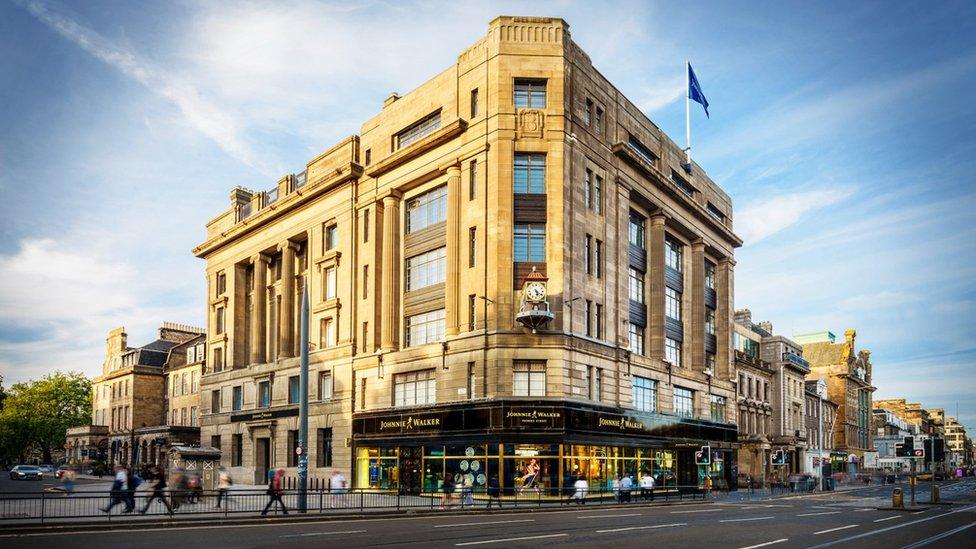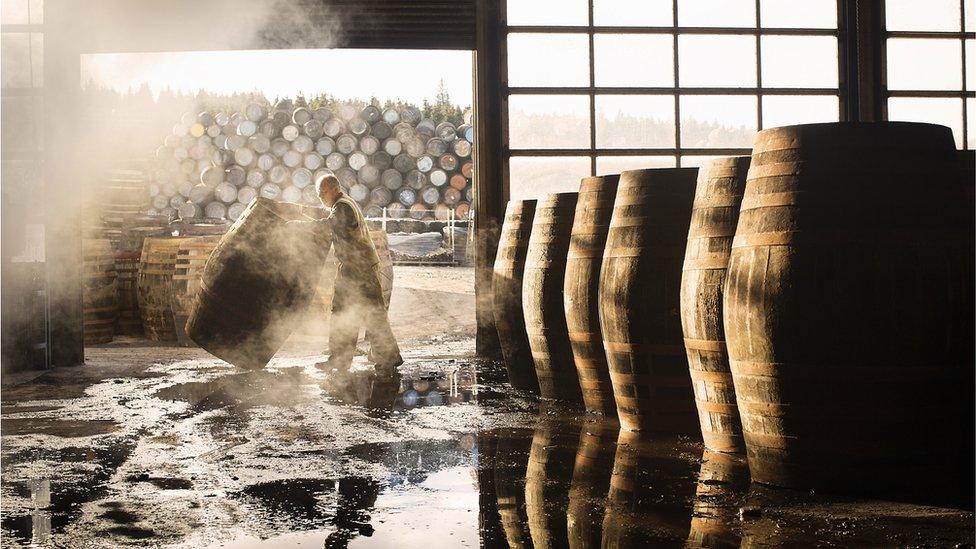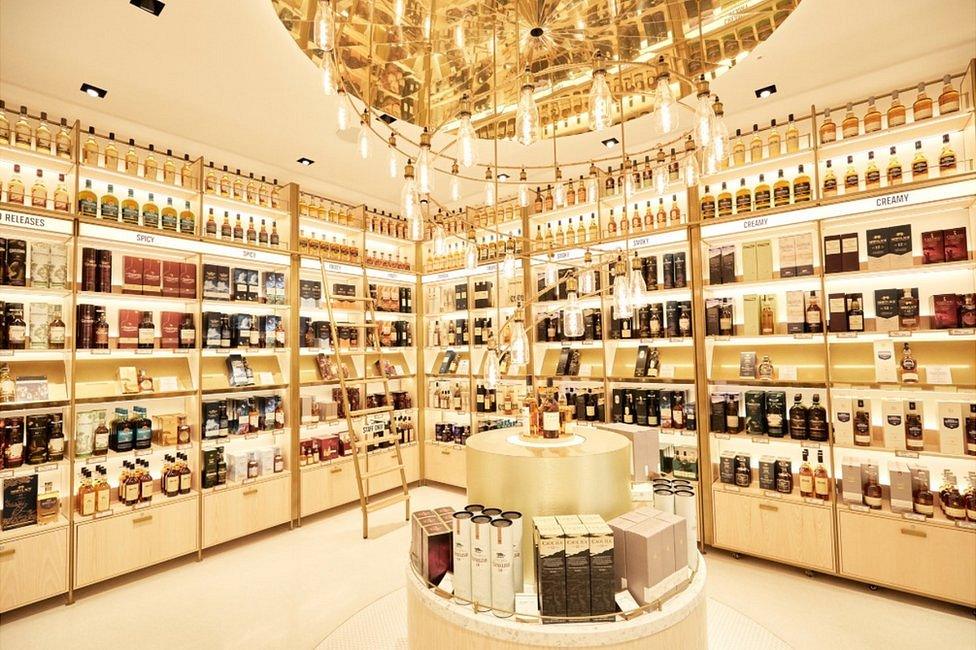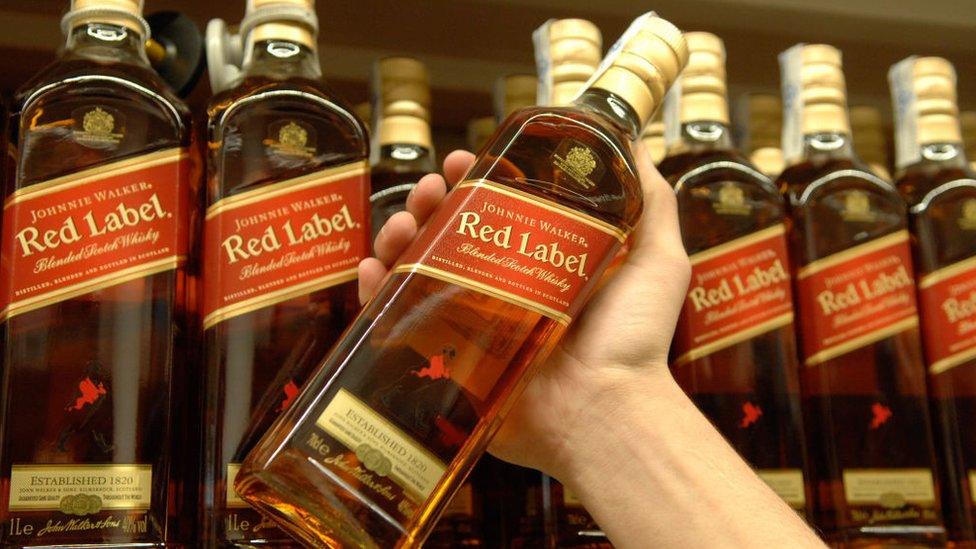The alcoholic alchemy of marketing Scotch
- Published

Diageo's eight-floor Johnnie Walker Princes Street in Edinburgh
A new visitor attraction replaces a large department store with a deep immersive experience, and celebration of whisky's world-class story-telling.
Distillers have had a strong run of export growth, and they're investing behind that to link tourism to an appetite for provenance.
International markets are recovering, and the boss of Diageo says the stars are aligning for a trade deal with India that would reduce sky-high tariffs. But supply chains and freight are causing problems.
When you buy a bottle of Scotch whisky, you take home 70 centilitres of coloured spirit.
The ingredients: barley, yeast, and Scottish mountain water, with flavour and colour added by years maturing in oak casks.
Any chemical analysis will miss the other component of your purchase: the magic of marketing.
There's nothing like Scotch for putting a premium on provenance, and locking out challengers.
Its value is not just in the rules, including distillation and at least three years maturation in Scotland: it's the ferocity with which the rules are applied.
There is protection around the world, with dogged legal pursuit of anyone who tries to pass off inferior spirit as Scotch.
That, in itself, is part of the myth-making. It's value is built up not just by being high quality, but by being so fiercely defended.
'Investment in Scotland'
From Monday, the public will be able to see the most extravagant iteration so far of that Scotch marketing.
A £25 ticket for "Johnnie Walker Princes Street" pays for a tour and buys into that whisky myth-making.
I've had a preview, and can report that it is an audio-visual tour de force. A Los Angeles company was hired to immerse its Hollywood-trained creatives in Scotland, and to interpret the story with an immersive, sensory wash of colour, smell and taste.
It's not just digital. The centre has recruited a troupe of actors to perform your way from room to room, among 150 people newly hired for the centre.

They myth surrounding Scotch is a huge part of its global appeal
Diageo owns Johnnie Walker, the most valuable commercial brand to come out of Scotland. With a 40% share of the Scotch whisky market, and dependent on Scotch for 23% of its business, it claims to be spending £185m on this project.
That also buys them big upgrades in four distilleries that contribute to the market-leading blend: Clynelish in Brora, Cardhu on Speyside, Glenkinchie in East Lothian and - yet to be transformed - Caol Ila on the island of Islay.
According to Ivan Menezes, the Diageo chief executive, the conversion of the entire former Frasers department store on Princes Street is "an investment in Scotland".
But it's not merely an act of generosity to the country that generates such profits for Diageo. This is a commercial decision to invest behind the brand and its provenance.
"Consumers are looking more and more to understand what's in their products, how is it made, who are the people behind it," the chief executive told me.
"And as you look to the next generation of consumers coming through, there's going to be an increasing demand. For instance, the thirst for product knowledge in China is extraordinary."
Whisky cathedral
Diageo will have done its own market research. But what is public knowledge, from the Scotch Whisky Association, is how fast whisky tourism has been growing.
In the year before the pandemic, it was worth £85m to the Scottish economy, with nearly 2.2 million visits, an average spend of more than £39 and 1,250 people employed. All those numbers were rising steeply until the pandemic struck.
Other distillers have been investing big as well. There have been whisky visitor centres for decades, but William Grant and Sons' Glenfiddich raised the game. It was followed by Edrington, with a new distillery for The Macallan near Craigellachie, built as a cathedral to whisky and a wow factor for visitors.
Numerous new distilleries have opened up, most of them including a visitor element.

The Edinburgh Johnnie Walker centre is aimed at least partly at locals' use, with three bars including a rooftop one, space for private events, a modest-sized venue for theatre or music performance, and a training space for the hospitality sector.
But it's the global reach of whisky that is clearly the focus. The newly-recruited staff have 23 languages between them.
And although the international footfall on Princes Street is currently very poor by non-pandemic standards, Ivan Menezes puts the investment in the context of a 202-year old Kilmarnock-born brand that has survived pandemics, wars and US Prohibition.
'Drink better'
Emerging from recession, "it's encouraging, across the world, with very strong growth. The premium end is where the market is growing fastest. Our single markets are growing double digit.
"A couple of trends have accelerated through the pandemic. One is spirits taking more share from beer and wine. The cocktail culture is very alive, people learning how to make highballs and manhattans, just like people discovered cooking from scratch. So spirits have benefited through the past 18 months with increased penetration.
The other is moving up to premium brands: "People are not drinking more, they're drinking better," says Menezes. "Last year, alcohol sales volumes dropped 6%. We only have 4% share of the world alcohol market. Where our gains come from is people drinking better. We see that trend has accelerated, in whisky, tequila and gin.
"The third trend is where people are spending their time. We do believe out-of-home spending and experiences are going to come back very strongly. It's right at the top of the list of what people want.
"We also see people shopping on e-commerce platforms. That will stick. So there are interesting shifts taking place, most of which are favourable for a company like Diageo."
Sales 'on fire'
His optimism is shared by rival distiller Pernod Ricard, one of the next biggest distillers of Scotch.
It puts out its full-year figures on Thursday showing like-for-like sales were up 6%, and getting back to pre-pandemic levels.
While airport duty free shops remain a long way down on their pre-pandemic figures, the four "strategic" whisky brands were recovering well; Chivas up 13%, Ballentine's up 12%, The Glenlivet single malt up 26% and Royal Salute rising 32%.
Part of this rebound comes with the removal of the 25% tariff the US government imposed on single malt Scotch, as retaliation against the European Union for subsidies to Airbus. It had harmed blended Scotch exports to the US as well.

Some of it comes with strong growth in China from that move up to premium brands. Johnnie Walker is marketed that way, leading from red label to black then double black, green gold and blue, with special editions along the way, including a Game of Thrones link.
India, home turf for Ivan Menezes, remains the biggest whisky market of all, but mainly drinking "Indian-Made Foreign Liquor", and that's partly because it's protected by a whopping 150% import tariff.
Diageo owns the biggest maker of IMFL, but is also seeing rapid growth of imported Scotch in India.
"In spite of these high rates of tariff, our Scotch whisky business is on fire in India, really growing very fast - faster than our domestic whiskies," says the company's boss. "We're seeing this trend to better brands, better products, and higher price points, are playing through very strongly in India.
'Indians love whisky'
Getting those tariffs down is a high priority for the distilling industry, and it is pressing the UK government to make it a priority in any moves towards a Free Trade Agreement. With the European Union trying to get an FTA with Delhi, it kept stalling.
A post-Brexit British deal would be likely to see Indians push for a big increase in work visas for Indians, and that could be politically difficult for the Johnson administration.
But according to Ivan Menezes, both prime ministers, Boris Johnson and Narendra Modi, have political pressure to get a trade deal: "Prospects are better than they've ever been in the last few decades.
"Both the UK and Indian governments are in serious conversations about FTAs. Scotch whisky is on the table. Obviously, this will take time, but I'm encouraged that we should see an improvement in the very high rates of tariffs.
"Indians love whisky. It's the biggest whisky market in the world, so I'm encouraged by the FTA discussions happening right now."
The return to growth for Scotch exports faces further hurdles in freight in and out. Supply lines to bottling plants for glass and packaging is "stressed", but manageable for a company that has built up deep relationships with its suppliers.
On the way out in freight containers to export markets, distillers are facing much higher costs due to disruption in the shipping industry. That is a cost Menezes says they simply have to absorb. And rather than pulling back on re-stocking overseas markets, Diageo is pushing to ensure any further disruption doesn't affect its Christmas and New Year sales.
- Published2 September 2021

